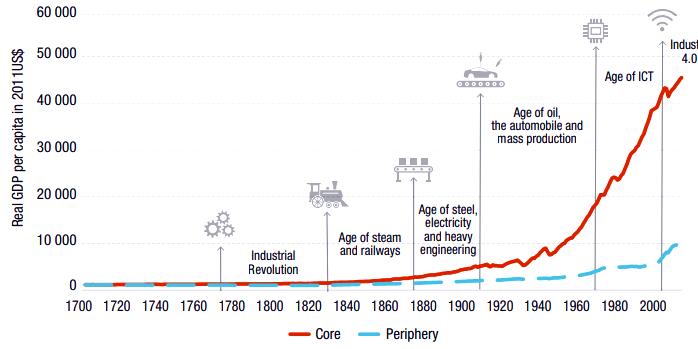Science & Technology
Technology And Innovation Report 2021: UNCTAD
- 05 Mar 2021
- 5 min read
Why in News
India was the biggest ‘overperformer’ in frontier technologies than the country's per capita Gross Domestic Products (GDP) would suggest, according to a recent country-readiness index of the Technology And Innovation Report 2021.
- The report was released by the United Nations Conference on Trade and Development (UNCTAD).
Key Point
- About the Report:
- The report examines the likelihood of frontier technologies widening existing inequalities and creating new ones.
- It also addresses the national and international policies, instruments and institutional reforms that are needed to create a more equal world of opportunity for all, leaving no one behind.
- Key Takeaway:
- Frontier Tech Market: The report shows that frontier technologies already represent a USD 350 billion market, which could grow to USD 3.2 trillion by 2025.
- International Cooperation: It calls for strengthened international cooperation to build innovation capacities in developing countries, facilitate technology transfer.
- Inclusive: Envisages increase women’s participation in digital sectors, conduct technological assessments and promote an inclusive debate on the impact of frontier technologies on sustainable development.
- Humans and Machines At Work: Technological change affects inequalities through its impact on jobs, wages and profits in following ways:
- Automation taking jobs
- Job displacement can also be accompanied by job polarization, which refers to an expansion in high- and low-wage jobs combined with a contraction in middle-wage jobs.
- Frontier technologies are being used to provide services via digital platforms that have spurred the creation of a ‘gig economy’.
- India Specific Findings:
- India’s actual index ranking is 43, while the estimated one based on per capita income is 108.
- This meant that India overperformed other countries by 65 ranking positions. India was followed by the Philippines, which overperformed by 57 ranking positions.
- India performed well in research and development.
- This is reflected in its abundant supplies of qualified and highly skilled human resources available at a comparatively low cost.
- However countries such as the United States, Switzerland and the United Kingdom were “best prepared” for frontier technologies.
- Challenges for Developing Countries:
- Demographic Changes: Low-income- and lower-middle-income countries have expanding and younger populations which will increase the supply of labour and depress wages, reducing the incentives for automation.
- Lower Technological and Innovation Capabilities: Low-income countries have fewer skilled people and depend to a large extent on agriculture which tends to be slower to take advantage of new technologies.
- Slow Diversification: Developing countries typically innovate by emulating industrialized countries, diversifying their economies, and absorbing and adapting new technologies for local use, but this process is slowest in the poorest countries.
- Weak Financing Mechanisms: Most developing countries have increased their R&D expenditures, but these are still relatively low. There is very little private funding of industrial technologies for productive applications.
- Intellectual Property Rights and Technology Transfer: Stringent intellectual property protection will restrict the use of frontier technologies that could be valuable in SDGs related areas such as agriculture, health and energy.
- Suggestions:
- The Report argues that frontier technologies are essential for sustainable development, but they also could accentuate initial inequalities.
- It is up to policies to reduce this risk and make frontier technologies contribute to increasing equality.
- A balanced approach building a robust industrial base and promoting frontier technologies is a must for success in the twenty-first century.
- The Report argues that frontier technologies are essential for sustainable development, but they also could accentuate initial inequalities.
Frontier Technologies
- Frontier technologies are defined as potentially disruptive technologies that can address large-scale challenges or opportunities.
- They include artificial intelligence (AI), the internet of things, big data, blockchain, 5G, 3D printing, robotics, drones, gene editing, nanotechnology and solar photovoltaic.

United Nations Conference on Trade and Development
- The United Nations Conference on Trade and Development (UNCTAD) was established in 1964 to promote development-friendly integration of developing countries into the world economy.
- UNCTAD is a permanent intergovernmental body headquartered at Geneva in Switzerland.
- Some of the reports published by it are:
- Trade and Development Report
- World Investment Report
- The Least Developed Countries Report
- Information and Economy Report
- Technology and Innovation Report
- Commodities and Development Report




